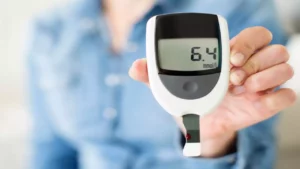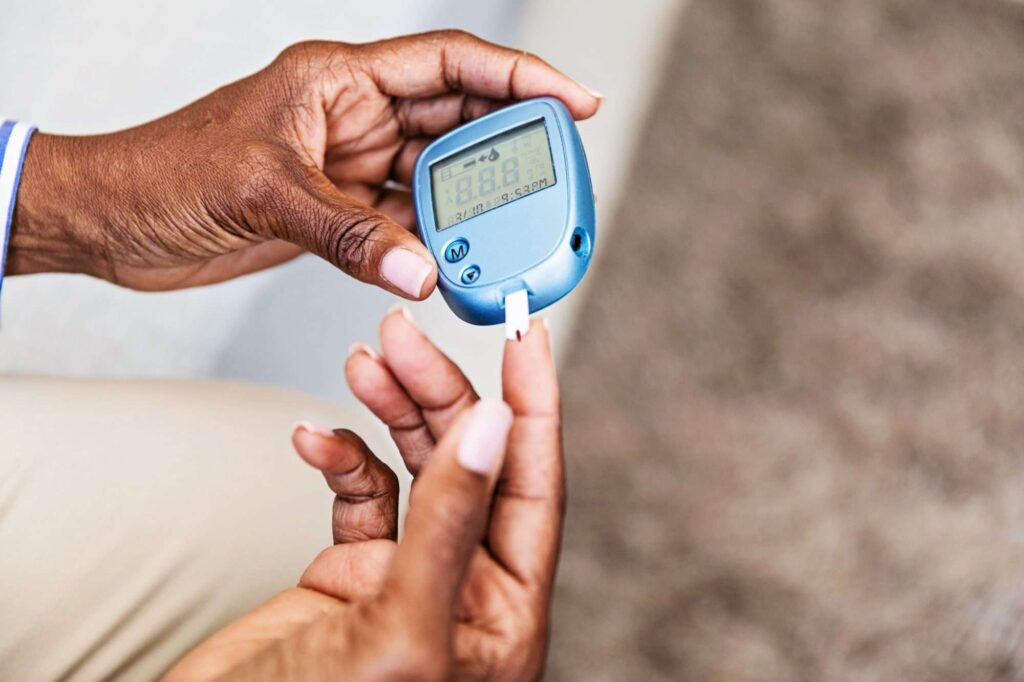Non-diabetic hypoglycemia, though less common than its counterpart in diabetic patients, can still pose significant challenges to health and well-being. Characterized by low blood sugar levels in individuals without diabetes, this condition can lead to symptoms ranging from mild discomfort to severe impairment. In this blog, we’ll delve into the causes, symptoms, diagnosis, and most importantly, the treatment options for non-diabetic hypoglycemia.
Contents
Understanding Non-Diabetic Hypoglycemia

Non-diabetic hypoglycemia occurs when blood sugar levels drop below normal in individuals who do not have diabetes. While it shares some similarities with diabetic hypoglycemia, the underlying causes and management strategies can differ significantly.
Causes of Non-Diabetic Hypoglycemia:
- Reactive Hypoglycemia: This occurs after eating, usually within a few hours. It’s often linked to a rapid rise in blood sugar followed by an exaggerated insulin response, causing a subsequent drop in glucose levels.
- Fasting Hypoglycemia: This type occurs when a person goes without food for an extended period, leading to depleted glycogen stores in the liver. It can result from various underlying conditions, such as certain medications, hormone deficiencies, or liver disorders.
- Alcohol-Induced Hypoglycemia: Excessive alcohol consumption can disrupt the body’s ability to maintain stable blood sugar levels, leading to hypoglycemia, especially in individuals with underlying liver dysfunction.
- Critical Illness: Some severe illnesses, particularly those affecting the liver, kidneys, or pancreas, can disrupt glucose metabolism and lead to hypoglycemia.
- Hormonal Imbalances: Disorders affecting hormones like insulin, cortisol, glucagon, or growth hormone can disrupt blood sugar regulation and contribute to hypoglycemia.
Symptoms of Non-Diabetic Hypoglycemia
The symptoms of non-diabetic hypoglycemia can vary depending on the severity and underlying cause but may include:
- Sweating
- Shakiness or tremors
- Palpitations
- Anxiety or nervousness
- Hunger
- Confusion or difficulty concentrating
- Fatigue
- Blurred vision
- Headaches
- Irritability
Diagnosis of Non-Diabetic Hypoglycemia
Diagnosing non-diabetic hypoglycemia involves several steps, including a thorough medical history review, physical examination, and laboratory tests. These may include:
- Blood Glucose Monitoring: This involves checking blood sugar levels during symptomatic episodes to confirm hypoglycemia.
- Fasting Tests: A supervised fasting test can help identify fasting hypoglycemia by monitoring blood sugar levels over several hours after a period of fasting.
- Hormone Tests: Checking levels of insulin, cortisol, growth hormone, and other hormones involved in glucose regulation can help identify hormonal imbalances contributing to hypoglycemia.
- Imaging Studies: In some cases, imaging studies such as CT scans or MRIs may be necessary to assess for structural abnormalities in organs involved in glucose metabolism, such as the liver or pancreas.
Treatment of Non-Diabetic Hypoglycemia
The treatment of non-diabetic hypoglycemia focuses on addressing the underlying cause and managing symptoms to prevent recurrent episodes. Treatment options may include:
Dietary Modifications

Dietary modifications play a crucial role in managing non-diabetic hypoglycemia, especially in cases of reactive hypoglycemia where blood sugar levels drop after meals. The goal of dietary changes is to stabilize blood sugar levels and prevent rapid fluctuations that can trigger hypoglycemic episodes.
Balanced Meals: Consuming balanced meals that include a combination of carbohydrates, protein, and healthy fats can help slow down the absorption of glucose into the bloodstream, preventing rapid spikes and crashes in blood sugar levels.
Complex Carbohydrates: Opting for complex carbohydrates with a low glycemic index, such as whole grains, legumes, fruits, and vegetables, can provide a steady source of glucose without causing sharp increases in blood sugar followed by crashes.
Frequent, Small Meals: Instead of large, infrequent meals, eating smaller, more frequent meals throughout the day can help maintain steady blood sugar levels and prevent hypoglycemia. Aim for three main meals and two to three snacks spaced evenly throughout the day.
Limit Refined Sugars: Minimize the consumption of refined sugars and simple carbohydrates, such as sugary snacks, desserts, and beverages, as they can lead to rapid spikes and subsequent drops in blood sugar levels.
Protein-Rich Foods: Including protein-rich foods in each meal and snack can help stabilize blood sugar levels by slowing down the absorption of carbohydrates. Good sources of protein include lean meats, poultry, fish, eggs, tofu, legumes, and dairy products.
Hydration: Staying hydrated is essential for maintaining optimal blood sugar levels. Aim to drink plenty of water throughout the day, as dehydration can exacerbate hypoglycemic symptoms.
Monitor Portion Sizes: Pay attention to portion sizes to avoid overeating, which can lead to rapid increases in blood sugar followed by crashes. Use measuring cups, spoons, or food scales to ensure portion control, especially for high-carbohydrate foods.
Meal Timing: Eating meals and snacks at regular intervals can help regulate blood sugar levels and prevent prolonged periods of fasting, which can trigger hypoglycemia. Try to eat breakfast within an hour of waking up and avoid skipping meals.
Snack Before Bed: For individuals prone to nocturnal hypoglycemia, consuming a small, balanced snack before bedtime can help stabilize blood sugar levels overnight. Opt for a combination of carbohydrates and protein, such as a slice of whole grain toast with nut butter or a small yogurt with fruit.
Medication Adjustment

In cases where medication use is contributing to non-diabetic hypoglycemia, adjusting or discontinuing the offending medication under medical supervision is a crucial step in treatment.
Review Current Medications: Work closely with your healthcare provider to review all medications you are currently taking, including prescription medications, over-the-counter drugs, and supplements. Some medications, such as certain antibiotics, antidepressants, antifungals, and anti-inflammatory drugs, can potentially lower blood sugar levels and contribute to hypoglycemia.
Adjust Dosages or Timing: Depending on the medication and its effects on blood sugar levels, your healthcare provider may recommend adjusting the dosage, frequency, or timing of administration to minimize the risk of hypoglycemia. This may involve reducing the dosage of the medication, splitting doses throughout the day, or taking medications with meals to mitigate blood sugar fluctuations.
Consider Alternative Medications: In some cases, it may be necessary to switch to alternative medications that are less likely to cause hypoglycemia. Your healthcare provider can help identify suitable alternatives based on your medical history, condition, and treatment goals.
Gradual Tapering: If discontinuing a medication that is contributing to hypoglycemia, it’s essential to do so gradually under medical supervision to minimize the risk of rebound effects or withdrawal symptoms. Abruptly stopping certain medications can lead to sudden changes in blood sugar levels and exacerbate hypoglycemic episodes.
Monitor Effectiveness: After making medication adjustments, closely monitor your blood sugar levels and symptoms to assess the effectiveness of the changes. Keep a record of your blood sugar readings, medication dosages, and any symptoms experienced to share with your healthcare provider during follow-up appointments.
Regular Follow-Up: Follow up with your healthcare provider regularly to assess your response to medication adjustments and make any necessary changes to your treatment plan. Your healthcare provider may recommend additional testing or monitoring to ensure that your blood sugar levels remain stable and that you are not experiencing any adverse effects from medication changes.
Hormone Replacement Therapy
For individuals with non-diabetic hypoglycemia caused by hormonal imbalances, hormone replacement therapy (HRT) may be recommended to restore normal hormone levels and improve blood sugar regulation.
Insulin Therapy: In cases where insulin deficiency or insensitivity is contributing to hypoglycemia, insulin therapy may be necessary to supplement insulin levels and improve glucose uptake by cells. This may involve the use of insulin injections or insulin pump therapy under medical supervision.
Glucagon Therapy: Glucagon is a hormone that helps raise blood sugar levels by stimulating the liver to release stored glucose into the bloodstream. In individuals with glucagon deficiency or impaired glucagon secretion, glucagon therapy may be prescribed to prevent and manage hypoglycemia.
Cortisol Replacement: Cortisol is a hormone produced by the adrenal glands that helps regulate blood sugar levels, among other functions. In individuals with adrenal insufficiency or dysfunction, cortisol replacement therapy may be necessary to restore normal cortisol levels and improve glucose metabolism.
Growth Hormone Therapy: Growth hormone plays a role in glucose metabolism and insulin sensitivity. In individuals with growth hormone deficiency, growth hormone therapy may be recommended to restore normal growth hormone levels and improve blood sugar regulation.
Thyroid Hormone Replacement: Thyroid hormones influence metabolism and can affect blood sugar levels. In individuals with hypothyroidism (underactive thyroid), thyroid hormone replacement therapy may be necessary to correct thyroid hormone levels and improve overall metabolic function.
Ongoing Monitoring: Throughout hormone replacement therapy, regular monitoring of hormone levels, blood sugar levels, and symptoms is essential to assess treatment efficacy and adjust hormone dosages as needed. Your healthcare provider will work closely with you to optimize hormone replacement therapy and minimize the risk of side effects or complications.
Blood Sugar Monitoring

Regular monitoring of blood sugar levels is essential for individuals with non-diabetic hypoglycemia to track changes, identify patterns, and make informed decisions about treatment and lifestyle adjustments. Blood sugar monitoring involves measuring blood glucose levels at specific times throughout the day using a blood glucose meter or continuous glucose monitoring (CGM) device.
Frequency of Monitoring: The frequency of blood sugar monitoring may vary depending on individual needs, treatment goals, and healthcare provider recommendations. Some individuals may need to monitor their blood sugar levels multiple times per day, while others may require less frequent monitoring.
Timing of Monitoring: Blood sugar levels should be monitored at key times throughout the day, including:
- Fasting: Before meals and snacks
- Postprandial: After meals to assess the impact of food on blood sugar levels
- Bedtime: Before going to bed, especially for individuals at risk of nocturnal hypoglycemia
Recording Results: Keep a record of blood sugar readings, along with details such as meal times, exercise, medication use, symptoms experienced, and any other relevant factors. This information can help identify patterns, triggers, and trends in blood sugar levels and guide treatment decisions.
Target Blood Sugar Ranges: Work with your healthcare provider to establish target blood sugar ranges based on factors such as age, overall health, treatment goals, and risk of hypoglycemia. Aim to maintain blood sugar levels within the recommended target range to minimize the risk of hypoglycemia and hyperglycemia.
Stress Management
Stress can significantly impact blood sugar levels and contribute to the onset and exacerbation of non-diabetic hypoglycemia. Learning effective stress management techniques can help individuals better cope with stressors, reduce the risk of hypoglycemic episodes, and improve overall well-being.
Identify Stressors: Start by identifying the sources of stress in your life, whether they’re related to work, relationships, finances, health concerns, or other factors. Recognize how these stressors affect your emotional and physical well-being and contribute to fluctuations in blood sugar levels.
Stress Reduction Techniques: Explore various stress reduction techniques and find those that work best for you. Some effective stress management techniques include:
- Deep Breathing: Practice deep breathing exercises to promote relaxation and reduce stress. Take slow, deep breaths, focusing on filling your lungs with air and exhaling slowly.
- Mindfulness Meditation: Engage in mindfulness meditation practices to cultivate awareness of the present moment and reduce stress. Focus your attention on your breath, bodily sensations, or the environment around you without judgment.
- Progressive Muscle Relaxation: Practice progressive muscle relaxation techniques to release tension and promote relaxation throughout your body. Tense and then relax each muscle group, starting from your toes and working your way up to your head.
- Yoga or Tai Chi: Incorporate gentle physical activities such as yoga or tai chi into your routine to reduce stress and promote relaxation. These practices combine movement, breathwork, and mindfulness to improve physical and mental well-being.
- Guided Imagery: Use guided imagery or visualization techniques to imagine yourself in a peaceful, calming environment, such as a serene beach or lush forest. Visualize yourself feeling calm, relaxed, and free from stress.
- Journaling: Keep a stress journal to track your thoughts, feelings, and reactions to stressors. Writing down your emotions can help you process and release stress, gain perspective, and identify patterns or triggers.
- Social Support: Seek support from friends, family members, or support groups who can offer understanding, encouragement, and practical assistance during times of stress. Sharing your thoughts and feelings with others can help alleviate stress and foster a sense of connection and belonging.
- Time Management: Prioritize tasks, set realistic goals, and establish boundaries to manage your time effectively and reduce stress. Break larger tasks into smaller, manageable steps, and delegate responsibilities when possible.
- Healthy Lifestyle Habits: Maintain healthy lifestyle habits, such as regular exercise, balanced nutrition, adequate sleep, and relaxation techniques, to support overall well-being and resilience to stress.
Consistency and Persistence: Incorporate stress management techniques into your daily routine and practice them consistently, even during times of low stress. The more you practice stress management techniques, the more effective they will become in helping you cope with stress and prevent hypoglycemic episodes.
Conclusion
Non-diabetic hypoglycemia can be a challenging condition to manage, but with proper understanding and treatment, individuals can effectively prevent and manage recurrent episodes. Furthermore, by addressing underlying causes, making lifestyle modifications, and seeking medical guidance, those affected by non-diabetic hypoglycemia can lead healthier, more fulfilling lives. If you or someone you know is experiencing symptoms of hypoglycemia, it’s essential to consult a healthcare professional for proper evaluation and management.
Do you want to get rid of diabetes? Join our online diabetes treatment program and reverse Diabetes naturally through lifestyle changes such as a Personalized Diet plan, Exercise, Yoga, dieticians, and health coaches.

